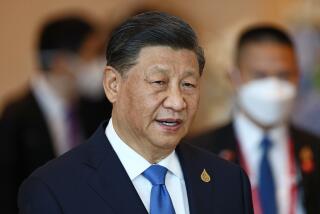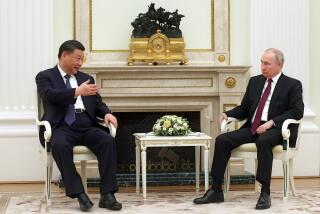Soviets, China to Hold Talks on Cambodia : Beijing Meeting to Focus on Problems With Vietnamese
- Share via
WASHINGTON — The Soviet Union and China have agreed to meet in Beijing next month in an attempt to work out a peace settlement for Vietnamese-occupied Cambodia, a U.S. official said today.
If successful, the talks could remove the remaining obstacle to a summit meeting between the world’s two biggest Communist powers, who have been at odds for three decades, the official said.
While neither the Soviets nor the Chinese have a direct role in the long-running Cambodian conflict, both powers hold sway over allies who are directly involved.
Secretary of State George P. Shultz was informed of the planned talks during his visit to Beijing last week, said the official, speaking on condition of anonymity.
But he cautioned that the success of the Cambodia meeting hinges on the upcoming “cocktail party” talks among the three-party Cambodian guerrilla coalition, Vietnamese officials and the Vietnam-appointed government in the capital of Phnom Penh.
The talks are scheduled to begin Monday in Indonesia, but Prince Norodom Sihanouk, former head of the Cambodian resistance movement, is already predicting that they will fail.
Sihanouk, who resigned this month from the presidency of the three-party guerrilla coalition, accused Vietnam today of being unwilling to conduct serious talks.
Vietnam moved into Cambodia in 1979, driving out the Chinese-backed Khmer Rouge rulers who massacred hundreds of thousands of people in their bloody four-year rule.
China has promised Shultz that it will seek to prevent Khmer Rouge leader Pol Pot from returning to Cambodia, the official said.
Under pressure from Moscow, Vietnam announced in May that it would withdraw its estimated 125,000 troops from Cambodia by 1990.
The U.S. official said China had indicated to the United States that Soviet cooperation over Cambodia would clear the way for a rapprochement. China had also been holding out for a Soviet withdrawal from Afghanistan, which began in May after more than eight years of occupation.
More to Read
Sign up for Essential California
The most important California stories and recommendations in your inbox every morning.
You may occasionally receive promotional content from the Los Angeles Times.













